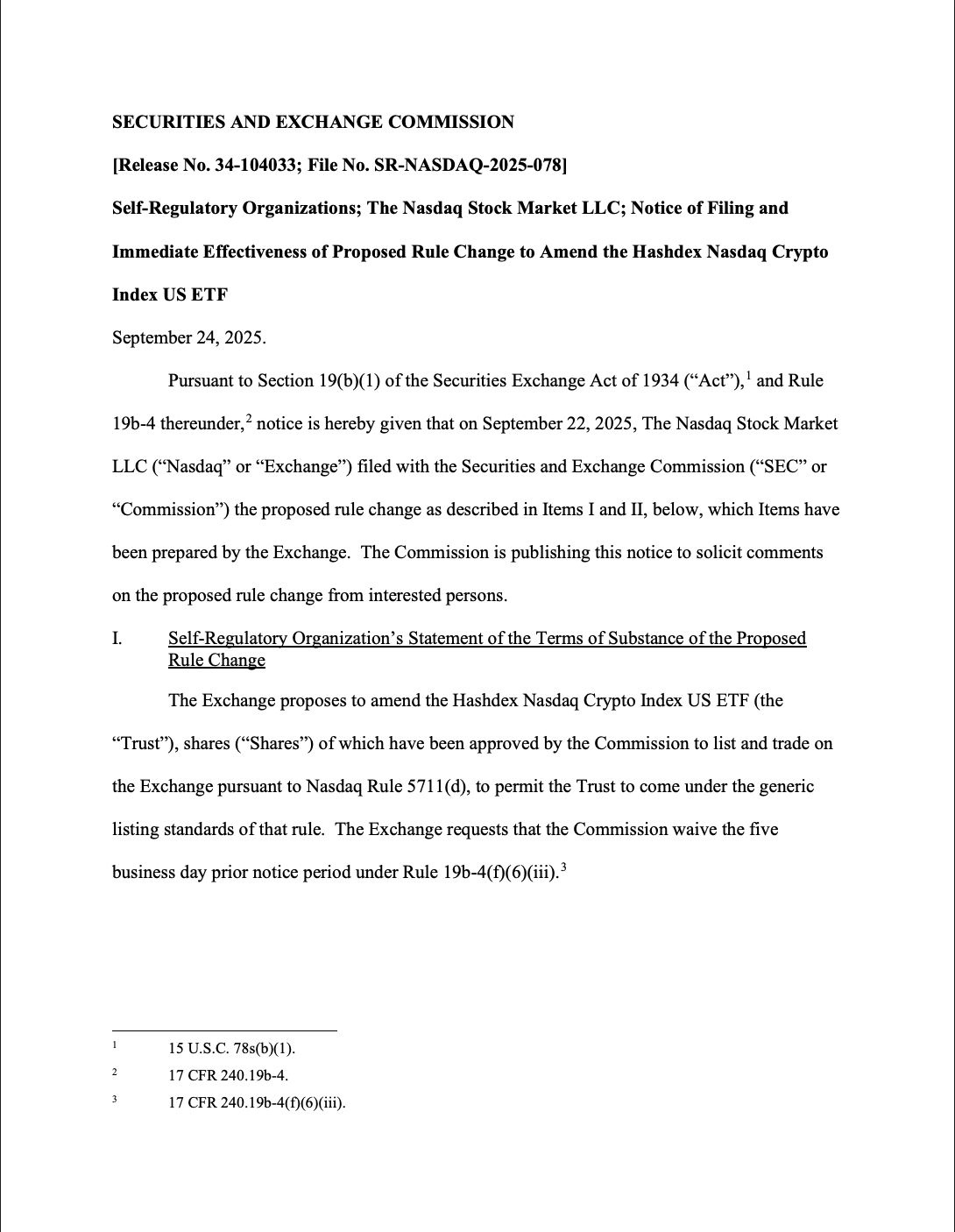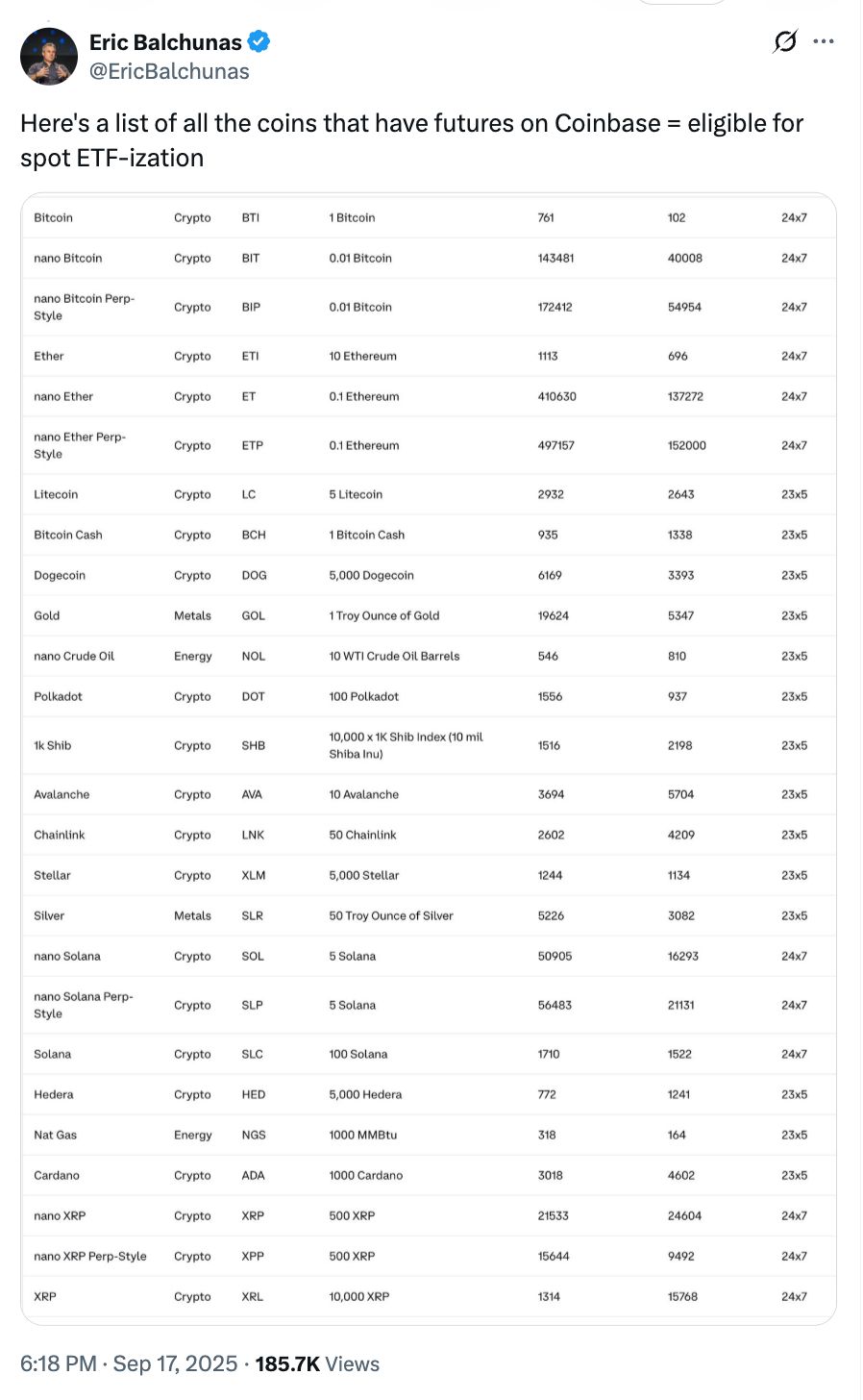Hashdex expands Crypto Index US ETF under SEC generic listing standards
Asset manager Hashdex expanded its Crypto Index US exchange-traded fund (ETF) to include XRP , SOL and Stellar following the generic listing rule change from the Securities and Exchange Commission (SEC).
The Nasdaq stock exchange-listed ETF now includes five cryptocurrencies held 1:1 by the fund, including Bitcoin and Ether, and is trading under the ticker symbol NCIQ, according to Thursday’s announcement .
The SEC approved generic listing standards for ETFs in September, paving the way for a faster ETF approval process for eligible cryptocurrencies.
 Hashdex's notice of expanding its ETF under the proposed SEC rule change for generic listings. Source: SEC
Hashdex's notice of expanding its ETF under the proposed SEC rule change for generic listings. Source: SEC
To qualify for generic listing eligibility, a cryptocurrency must be classified as a commodity or feature futures contracts listed on reputable exchanges. Additionally, eligible cryptos must be subject to financial surveillance under the US Intermarket Surveillance Group.
Market analysts and industry executives anticipate a torrent of new crypto ETF filings due to the new standards, which will give stock market participants access to the crypto markets and blur the line between traditional financial instruments and digital assets.
US SEC begins approving multi-asset crypto ETFs to hasten innovation
The SEC approved the Grayscale Digital Large Cap Fund , the first US multi-asset crypto ETF, on Sept. 17. Grayscale’s fund includes BTC, ETH, XRP, SOL and Cardano .
SEC Chair Paul Atkins is spearheading efforts to streamline the ETF approval process for cryptocurrencies as part of a broader initiative to modernize the financial system for digital finance.
 Source: Eric Balchunas
Source: Eric Balchunas
Atkins recently proposed an “innovation exemption” for crypto companies , a regulatory sandbox that would allow crypto projects to experiment with new technologies without fear of regulatory reprisal from government agencies.
The SEC, at the behest of US President Donald Trump’s administration, has issued a series of statements and policy proposals in 2025 designed to reduce the regulatory burden on crypto companies — a stark departure from the SEC under former Chair Gary Gensler’s leadership .
These policies include ending regulation by enforcement or filing lawsuits against projects without due notice, crafting comprehensive market structure rules for digital assets and classifying most cryptocurrencies as commodities.
Disclaimer: The content of this article solely reflects the author's opinion and does not represent the platform in any capacity. This article is not intended to serve as a reference for making investment decisions.
You may also like
2025 TGE Survival Ranking: Who Will Rise to the Top and Who Will Fall? Complete Grading of 30+ New Tokens, AVICI Dominates S+
The article analyzes the TGE performance of multiple blockchain projects, evaluating project performance using three dimensions: current price versus all-time high, time span, and liquidity-to-market cap ratio. Projects are then categorized into five grades: S, A, B, C, and D. Summary generated by Mars AI This summary was generated by the Mars AI model, and the accuracy and completeness of its content are still being iteratively updated.

Mars Finance | "Machi" increases long positions, profits exceed 10 million dollars, whale shorts 1,000 BTC
Russian households have invested 3.7 billion rubles in cryptocurrency derivatives, mainly dominated by a few large players. INTERPOL has listed cryptocurrency fraud as a global threat. Malicious Chrome extensions are stealing Solana funds. The UK has proposed new tax regulations for DeFi. Bitcoin surpasses $91,000. Summary generated by Mars AI. The accuracy and completeness of this summary are still being iteratively updated by the Mars AI model.

How much is ETH really worth? Hashed provides 10 different valuation methods in one go
After taking a weighted average, the fair price of ETH exceeds $4,700.

Dragonfly partner: Crypto has fallen into financial cynicism, and those valuing public blockchains with PE ratios have already lost
People tend to overestimate what can happen in two years, but underestimate what can happen in ten years.

